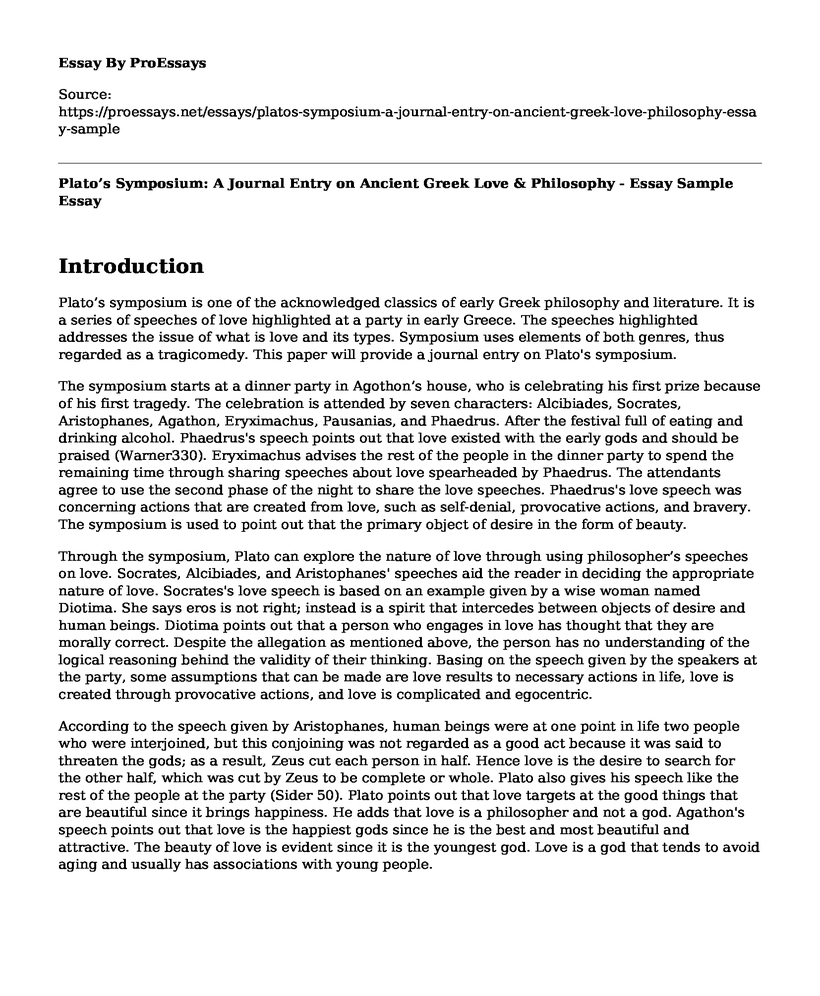Introduction
Plato’s symposium is one of the acknowledged classics of early Greek philosophy and literature. It is a series of speeches of love highlighted at a party in early Greece. The speeches highlighted addresses the issue of what is love and its types. Symposium uses elements of both genres, thus regarded as a tragicomedy. This paper will provide a journal entry on Plato's symposium.
The symposium starts at a dinner party in Agothon’s house, who is celebrating his first prize because of his first tragedy. The celebration is attended by seven characters: Alcibiades, Socrates, Aristophanes, Agathon, Eryximachus, Pausanias, and Phaedrus. After the festival full of eating and drinking alcohol. Phaedrus's speech points out that love existed with the early gods and should be praised (Warner330). Eryximachus advises the rest of the people in the dinner party to spend the remaining time through sharing speeches about love spearheaded by Phaedrus. The attendants agree to use the second phase of the night to share the love speeches. Phaedrus's love speech was concerning actions that are created from love, such as self-denial, provocative actions, and bravery. The symposium is used to point out that the primary object of desire in the form of beauty.
Through the symposium, Plato can explore the nature of love through using philosopher’s speeches on love. Socrates, Alcibiades, and Aristophanes' speeches aid the reader in deciding the appropriate nature of love. Socrates's love speech is based on an example given by a wise woman named Diotima. She says eros is not right; instead is a spirit that intercedes between objects of desire and human beings. Diotima points out that a person who engages in love has thought that they are morally correct. Despite the allegation as mentioned above, the person has no understanding of the logical reasoning behind the validity of their thinking. Basing on the speech given by the speakers at the party, some assumptions that can be made are love results to necessary actions in life, love is created through provocative actions, and love is complicated and egocentric.
According to the speech given by Aristophanes, human beings were at one point in life two people who were interjoined, but this conjoining was not regarded as a good act because it was said to threaten the gods; as a result, Zeus cut each person in half. Hence love is the desire to search for the other half, which was cut by Zeus to be complete or whole. Plato also gives his speech like the rest of the people at the party (Sider 50). Plato points out that love targets at the good things that are beautiful since it brings happiness. He adds that love is a philosopher and not a god. Agathon's speech points out that love is the happiest gods since he is the best and most beautiful and attractive. The beauty of love is evident since it is the youngest god. Love is a god that tends to avoid aging and usually has associations with young people.
Conclusion
In conclusion, the symposium by Plato is a series of speeches on love given at the party in Agathon's house I ancient Greece. The main concern of these speeches is love, purposes of love, appraised love, and interpersonal relationships created as a result of love. Symposium can be classified as tragicomedy because it makes use of both genres of literature. The attendants of the party highlight what love means in their world using illustrations. The attendants included Aristodemus, Apollodorus, Socrates, Agathon’s, Eryximachus, Phaedrus, and Pausanias. As for Phaedrus, love has attributes of bravery and being the youngest god. For Eryximachus, love exceeds the interpersonal connections and is found in the coexistence of opposites. Also, Aristophanes points out that Zeus is a jealous god, cuts human beings into two halve; that is why people are usually in search of the other half in the form of love. Agathon, on the other hand, praises love with excellent prose and defines the moral character of love, which involves justice, courage, and wisdom.
Works cited
Sider, David. "Plato's" Symposium" as the Dionysian Festival." Quaderni urbinati di Cultura Classica 4 (1980): 41-56. Warner, Martin. "Love, self, and Plato's Symposium." The Philosophical Quarterly (1950- ) 29.117 (1979): 329-339.
Cite this page
Plato's Symposium: A Journal Entry on Ancient Greek Love & Philosophy - Essay Sample. (2023, Aug 16). Retrieved from https://proessays.net/essays/platos-symposium-a-journal-entry-on-ancient-greek-love-philosophy-essay-sample
If you are the original author of this essay and no longer wish to have it published on the ProEssays website, please click below to request its removal:
- Paper Example on Nuclear Weapons Should be Eliminated
- Paper Example on Martin Luther King: The Man Who Dreamed
- Communication Identity Essay
- New World Traditions and Slavery Paper Example
- Issue Identification: Analysis of an Ethical Issue Facing McDonald's
- Latino History as United States History Article Review Paper Example
- Paper Example on Ethical Principles of Coventry University







